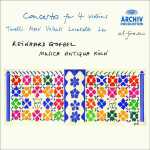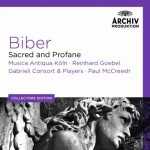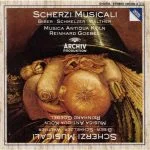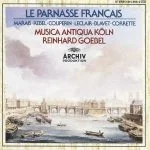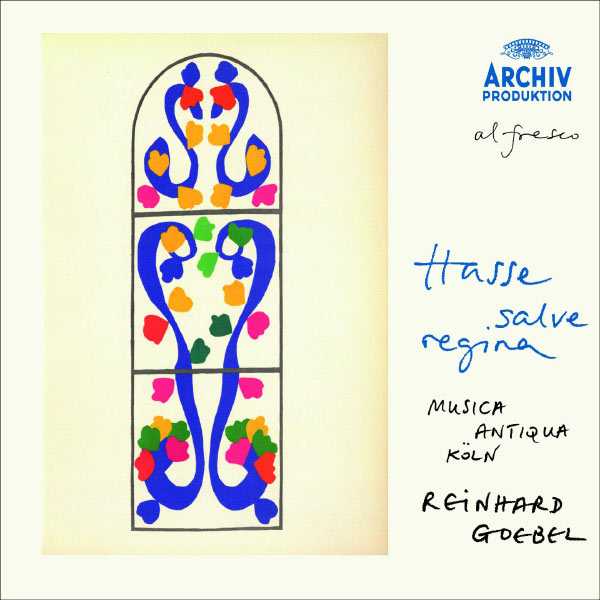
Composer: Johann Adolf Hasse
Performer: Barbara Bonney, Bernarda Fink, Musica Antiqua Köln
Conductor: Reinhard Goebel
Format: FLAC (tracks)
Label: Archiv
Catalogue: E4776730
Release: 2007
Size: 360 MB
Recovery: +3%
Scan: cover
Sinfonia Op. 3 No. 3
01. 1. Allegro assai
02. 2. Andante, sempre piano
03. 3. Menuet – Presto – Menuet
Salve Regina A-dur(in a-major)
04. 1. A tempo giusto “Salve Regina”
05. 2. Adagio “Ad te clamamus”
06. 3. Adagio – Allegro “Eja ergo”
07. 4. Andante – Adagio “Et Jesum benedictum”
Sinfonia F-dur op.3, No.5
08. 1. Allegro assai
09. 2. Andante ma sempre piano
10. 3. Allegro e con spirito
Motette “Chori angelici laetantes”
11. 1. Allegro man non troppo “Chori angelici laetantes” laetant
12. 2. Moderato assai – Allegro “Mundi neglecta pompa et vanitate”
13. 3. Moderato assai – Andante “Bone Jesu, te quaerendo”
14. 4. Allegro “Alleluja”
Fuga & Grave g-moll (in G minor)
15. Fuga. A la breve
16. Grave – Fuga
Salve Regina in E flat major
17. 1. Andantino “Salve Regina”
18. 2. Largo “Ad te clamamus”
19. 3. Allegretto “Eja ergo”
20. 4. Andante, ma non troppo “Et Jesum benedictum”
“During this visit, these young ladies were so obliging as to sing me a salve regina, lately set by their father, in duo. It is an exquisite composition, full of grace, taste and propriety.” So wrote the english traveller charles burney in 1772. The “father” was Johann Adolf Hasse, one of the 18th century’s most famous composers – and here he is in “a delightful programme, thoughtfully put together and very well executed” (Gramophone)
One prominent Nazarene minister, when asked what he did for a living, was heard to say, “I sell fire insurance.” Viennese composer Johann Adolf Hasse could have used some of that fire insurance in 1763 when his house in Dresden burned down during an attack by enemy forces, extinguishing a complete edition of his work before it went to press. Hasse wasn’t just any composer, but a household name in Europe, and he was Frederick the Great’s personal favorite composer and the most popular figure, particularly as it pertained to opera, from the time of Bach until the rise of Mozart, whose ascent he lived to witness. Hasse’s dominance in German-speaking lands came, to some extent, to the exclusion of other composers of worth, and conductor Reinhard Goebel, in his notes for Archiv’s Hasse: Salve Regina, featuring his group Musica Antiqua Köln, he suggests that his current lack of renown may be a corrective of history, out of “a desire to see fair play.” Nevertheless, Goebel attempts here to make the best case for Hasse using works Hasse composed in Dresden in the 1730s that somehow escaped the flames, and indeed, there remain mountains of unpublished music by Hasse extant, though proper documentation awaits the better part of it.
The works here include sinfonias written for the opera Cleofide (1731) and Asteria (1737), two settings of the Salve Regina (1730, 1767 — altogether he set this text some 13 times), the motet Chori angelici laetantes, and an orchestral Fuga e Grave in G minor, which even Goebel admits might be the work of Franz Xaver Richter. With its sighing chromaticisms and turbulent rhythmic profile, it certainly sounds more like Richter, not to mention that its three-movement scheme resembles a sinfonia, as it is titled in the source named for Richter, rather than a “Fuga e Grave.” The rest of the music here, all rightly credited to Hasse alone, maintains a distinct and consistent profile throughout. The Cleofide sinfonia is bright, witty, ingratiating, and somehow deeply boring. The earlier of the two Salves was very popular in its time; it was available in print by 1736, and no less than 12 manuscript copies of the work scattered throughout Europe’s libraries are attested to in Grove’s. The vocal line is gracious and not too tough on alto Bernarda Fink, who performs it splendidly well, and the orchestral writing is light and unobtrusive. To some extent Musica Antiqua Köln’s pristine performances of this music tends to heighten the sense of boredom; a sole descending figure in the second of the Salves is the only detail that really stands out — the rest is like an undisturbed pool with no ripples on the surface.
Goebel clearly values this music, and Musica Antiqua Köln’s Hasse: Salve Regina is a noble attempt to restore Hasse’s vaunted reputation, but on the “wow me” scale, it ranks somewhere below the bottom. It appears that the historical corrective concerning Hasse relates to more than his extraordinary success; his relative lack of concern about posterity and innate understanding of what the nobility expected in music have both contributed to his obscurity. That is not a “quirk” of history so much as history working as it should, and while Musica Antiqua Köln’s Hasse: Salve Regina is beautifully performed and recorded; one feels compelled to say thanks — but no thanks.
